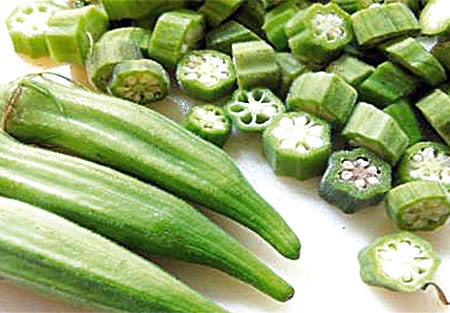HOW TO USE OKRA TO TREAT DIABETES —Scientists
Traditionally, drinking “okra water” has been used as an alternative treatment for diabetes. It is assumed that its large amount of soluble dietary fibres will retard glucose absorption from the intestinal tract. Some have even suggested that drinking it helps to lessen diabetes symptoms.
Like many other traditional treatments, knowing the appropriate dose that is latent and safe has always been a challenge. Now, researchers reveal that 10:90 per cent (seeds: peels) formulation is the most suitable for the development of okra-based antidiabetic nutraceutical formulation for the management of diabetes mellitus.
In this study, researchers revealed that 10:90 per cent (seeds: peels) formulation retarded an increase in postprandial blood glucose level than the other combinations.
Various proportions of the powdered seeds and peels samples were thoroughly mixed in a ratio of 90:10; 80:20; 70:30; 60:40, 50:50 per cent, respectively and vice versa.
The proximate composition and some functional properties such as antioxidant capacity (AC), glucose absorption capacity (GAC) and glucose dialysis (GD) were assessed.
Ex-maradi (a commercially available dry-okra fruits) commonly found in the northern part of Nigeria was used in this study designed to develop appropriate okra-based antidiabetic formulation in the 2018 Tropical Journal of Natural Product Research.
Diabetes mellitus is one of the most common problems challenging public health in the 21st century. It is a disorder marked by high blood sugar level which occurs when the pancreas cannot produce enough of insulin or the body cannot effectively use the produced insulin.
Treatment measures of diabetes include diet control, physical exercise, and use of oral medications for type 2 diabetes only or use of insulin in type 1 diabetes.
Recently, a high-fibre diet is being used as a supplement in controlling diabetes. Water-soluble dietary fibres have the potential to reduce glucose absorption, increase the liver extraction of insulin and increase insulin sensitivity at the level of cells in the body.
Okra is one of the economically important vegetable crops that have been used for a long time as a daily food in many countries because of its nourishing components. It is characterised by mucilaginous properties and high fibre content.
It is a multipurpose crop due to the various uses of its parts (leaves, buds, flowers, pods, stems and seeds). The immature okra fruits are consumed as vegetables and can be used in salads, soups and stews.
Apart from being an excellent source of dietary fibre, okra contains significant amounts of vitamins, minerals, and potent antioxidants that may help prevent or treat many ailments.
Okra is low in calories and low on the glycaemic index (GI) scale, making it beneficial for people trying to lose weight. Among many other health benefits, okra is also gaining ground as a superfood for cancer.
Moreover, okra is known to improve and benefit health in a number of ways, including preventing and treating constipation, lowering cholesterol, improving symptoms of depression, helping to treat sore throat and lung inflammation, reducing the risk of certain cancers like colorectal cancer.
Now, a study published in the Journal of Pharmacy and Bioallied Sciences in 2011 using rats found a potentially beneficial effect. Diabetic rats were given powdered okra peel and seed had reductions in their blood sugar levels at the end of the 28-day study, compared to rats in the control group that didn’t get powdered okra.
Another study published in “ISRN Pharmaceutics” in 2011, found that a solution made from okra helped decrease the absorption of glucose in rats with diabetes.
Moreover, a 2017 study published in PLOS One reported that myricetin in okra increased the absorption of sugar in the rats’ muscles, lowering their blood glucose levels. Myricetin is a substance present in okra and some other foods, including red wine and tea.
Furthermore, a 2012 Food Science and Human Wellness review highlights a number of other laboratory and animal studies that have linked myricetin to reduced blood sugar.Recently, the possible interaction of the soluble dietary fibre fraction of okra with oral metformin has been a matter of concern because this vegetable is being widely used by diabetics as an adjunct to diabetes treatment.
In the study, the water-soluble fraction of okra fruits made by soaking sliced okra pods in water for 10 to 15 minutes and collecting its filtrate significantly reduces the absorption of glucose. The 2011 study was published in the journal, Pharmaceutics.
@ Nigerian Tribune


